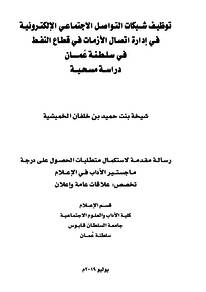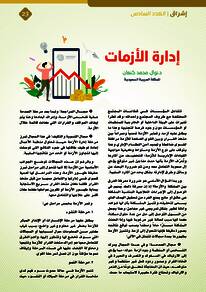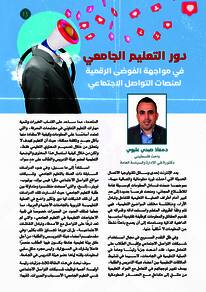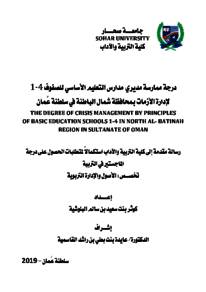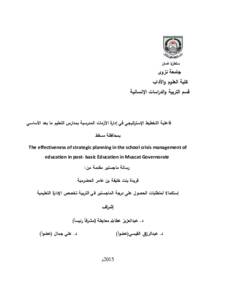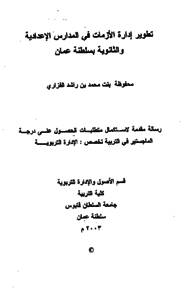Document
توظيف شبكات التواصل الاجتماعي الإلكترونية في إدارة اتصال الأزمات في قطاع النفط في سلطنة عُمان
Publisher
جامعة السلطان قابوس
Gregorian
2019
Language
Arabic
Subject
English abstract
The study aims at investigating the extent of using electronic social networks (Facebook, Twitter and Instagram) in managing corporate crisis communication in the Sultanate of Oman; by investigating a number of crises faced by the oil sector during the last five years; via analyzing the posts and tweets of the accounts of the Ministry of Commerce and Industry, the Ministry of Oil and Gas and the Ministry of Manpower during these crises; which are respectively: the crisis of fuel 95, the crisis of high oil prices, and the crisis of the layoffs of oil companies; in addition to analyzing the hashtags launched by the public
these networks then studying the opportunities offered by these networks to enhance the ministries' communication with the public, especially during times of crisis. The study relied on the survey methodology using the content analysis tool during the period from 10 December 2018 to 10 March 2019 for a total of 89 posts, 38 hashtags and 28103 comments. The study also interviewed admins of the social networks in the three above mentioned ministries, where 6 admins were interviewed, two from each ministry. The study found out that the ministries still do not benefit from the interactive advantages offered by these networks. They still use one way communication related to crises discussed through these networks, although they provide a good opportunity to communicate with the public directly. All ministries neither responded to the public's comments on their posts nor on the hashtags that were launched concerning the crises under study. Instead, ministries only disseminated their crisis-oriented messages, which were brief and did not contain sufficient and clear information about the crises in hand. The analysis revealed the silence of the ministries and the lack of sufficient information and facts on the crises, which led the public to launch hashtags in order to produce and disseminate information from
their personal accounts. The results also indicated that the employment of electronic social networks in
managing crisis communication faced by these ministries are similar in all the different networks, all treated as a single network, and findings stressed that "Twitter" included more intensive discussions during crises, either through the ministries' posts or the comments and hashtags of the public.Moreover, results of the interviews showed that these ministries do not own a unified strategy for crisis communication management via their social networks and that every crisis is dealt with simultaneously. Furthermore, there are no specialized staff to manage the content of the social networks besides that the needed information regarding the crisis cannot be published before taking a permission from the higher administration of the ministries. The negative impressions and constant criticism of the public led these ministries to keep silent in responding to the comments on social networks. Finally, the study recommends that the Omani government corporations need to develop a deliberate and written strategy to manage corporate communication during crisis through social networks, since these channels are important in offering direct and prompt communication with the public especially during times of crisis. The study also recommends that Omani corporations should establish specialized departments for social
media management and employ qualified staff to benefit from utilizing social networks. In addition, timely surveys should be conducted targeting the public following these accounts in order to determine the most appropriate communication methods for them, in terms of language and the tone of the posts and to identify their attitude especially during the time of crisis.
Description
رسالة جامعية
Member of
Resource URL
Category
Theses and Dissertations

